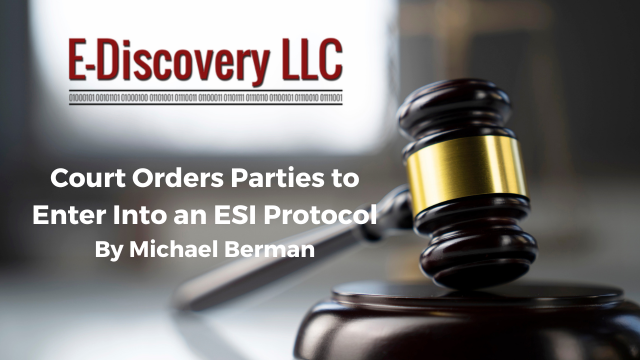
In the unusual context of a Delaware federal subpoena for discovery in a Spanish proceeding, a court ordered the parties“to meet and confer to discuss the scope of each request and to enter an agreed-upon ESI protocol and protective order.” In re Application of FourWorld Capital Management LLC, Petitioner, for an Order Pursuant to 28 U.S.C. § 1782 to Conduct Discovery for Use in a Foreign Proceeding, 2024 WL 1637400 (D. Del. Apr. 16, 2024)(emphasis added).
Petitioner, FourWorld, and others were litigating in Spain. The underlying dispute was essentially a hostile takeover by a majority shareholder that purchased all of the outstanding shares of a company and took it private. The takeover was approved and, “[u]nder Spanish law, the CNMV’s decision to approve a takeover request is subject to judicial review by courts in Spain.” Id.
That request was successful and the court ordered the parties “to meet and confer to discuss the scope of each request and to enter an agreed-upon ESI protocol and protective order.” [emphasis added].[1]
Michael Berman discussing In re Application of FourWorld Capital Management LLC, Petitioner, for an Order Pursuant to 28 U.S.C. § 1782 to Conduct Discovery for Use in a Foreign Proceeding, 2024 WL 1637400 (D. Del. Apr. 16, 2024)(emphasis added).
Discovery disputes are not confined to American courts and a discovery dispute in the Spanish proceedings followed. In the court’s words: “After receiving the non-confidential documents from the administrative file [in the Spanish proceeding], FourWorld filed a motion challenging the file as incomplete…. FourWorld additionally petitioned the Spanish Court to supplement the file with documents related to the Kroll Report, such as draft reports, spreadsheets, and communications with CNMV and PwC.”
FourWorld’s request was denied by the Spanish court and its appeal remains pending.
One of the American respondents had performed a valuation analysis and provided advice regarding the takeover bid.
FourWorld filed a petition under 28 U.S.C. §1782, to obtain discovery in Delaware. The Delaware District Court explained that: “Under Section 1782, United States district courts have discretion to grant applications for discovery to be used in a foreign proceeding.”
The FourWorld court analyzed the applicable statutory factors and found, over objections, that discovery was authorized by §1782.
Although respondents’ opposition to FourWorld’s §1782 petition for discovery was unsuccessful, in the alternative, respondents asked that the parties be ordered to: “1) meet and confer regarding the scope and relevance of each request; 2) enter an agreed-upon ESI protocol and protective order; and 3) amend the Subpoenas to seek only documents and information that are narrowly tailored to the issues before the Spanish Court and minimize Respondents burden.”
That request was successful and the court ordered the parties “to meet and confer to discuss the scope of each request and to enter an agreed-upon ESI protocol and protective order.” [emphasis added].[1]
As a tangential – but interesting – point, the court wrote: “[T]he Court cannot make a proportionality determination merely because the Application requests ‘all documents’ related to the Kroll Report…. Similarly, without an estimate of the number of documents triggered by each request, the Court cannot find that the requests are overbroad.”
Specificity and metrics were both necessary and absent.
To the same effect, in denying a request to shift costs, the court wrote: “While Respondents assert that ‘[respondent] Kroll has worked with issuing counsel before in responding to other § 1782 applications, and from experience, knows the cost and burden associated with compliance,’… this is insufficient to establish that the cost of compliance would be significant in this matter.” [2]
Notes
[1] For background material on ESI Protocols, please see “ESI Protocol” v. “Discovery Plan” (Jan. 2, 2024), “Modern Attachments,” ESI Protocols, & Second Chances (Jun. 8, 2023), Judicial Interpretation of an ESI Protocol (Mar. 13, 2023), and Should an ESI Protocol Be Incorporated Into a Court Order? (Mar. 13, 2023).
[2] Specificity has long been required. “Old” Sedona Paper Implements the “Specificity” Provision of Discovery Responses (Dec. 9, 2021); General Objections, Dracula, and “Whac a Mole” (Apr. 16, 2024). Of course, the same is true of discovery requests. New Sedona Primer Implements the “Bull’s Eye View” of Discovery Requests (Dec. 8, 2021).


